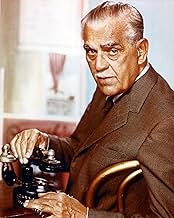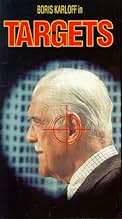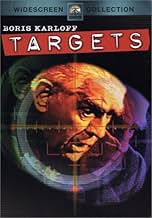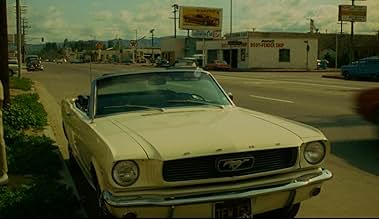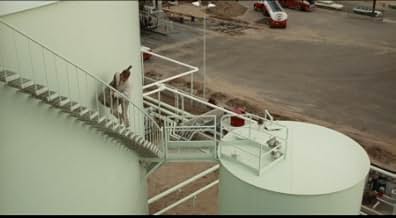Uma estrela de cinema de terror idoso, ao fazer uma aparição em um cinema drive-in, enfrenta um veterano psicótico da Guerra do Vietnã, que se tornou um atirador assassino de multidões.Uma estrela de cinema de terror idoso, ao fazer uma aparição em um cinema drive-in, enfrenta um veterano psicótico da Guerra do Vietnã, que se tornou um atirador assassino de multidões.Uma estrela de cinema de terror idoso, ao fazer uma aparição em um cinema drive-in, enfrenta um veterano psicótico da Guerra do Vietnã, que se tornou um atirador assassino de multidões.
- Direção
- Roteiristas
- Artistas
- Prêmios
- 1 vitória no total
- Marshall Smith
- (as Monty Landis)
- Waiter
- (as Tim Burns)
Avaliações em destaque
Despite the point being rather muddled, Targets makes up for that with the exciting way that the plot plays out and the stream of tributes and comments on Karloff's (sorry, Orlock's) career. It's nice to see Karloff enjoying himself, and the introspective nature of the movie ensures that he gets the chance to do this. Peter Bogdanovich is well known for being a director who is also a fan of cinema, and this movie also gives him a chance to tribute the medium that he evidently loves. As a fan of cinema myself, it always makes me happy to see this sort of thing, and that marks another reason for my enjoyment of this movie. The way that the plot plays out makes the movie predictable, but in a way that adds to the idea of 'real horror', as we can see what's going to come; it's like a car crash - it's obvious what's going to happen, yet all we can do is just sit back and watch. On the whole, this is a classy thriller and while it never hammers home it's point enough to ensure that you know it's actually got a point, it works because of it's tension and well paced plot. This will also be a must see movie for fans of the great Boris Karloff.
Cineaste Peter Bogdanovich's debut directing effort, sadly, to this day remains a topical hot spot. Released as it was just after the assassinations of Martin Luther King Jr. and Robert Kennedy, Targets carried much relevance even though it was hardly a success at the box office. Over the years it has come to gain a cult following that is much deserved, the low budget production value actually helping to keep it uneasily potent.
Story is structured by way of two separate narrative threads, one sees Karloff as veteran horror film actor Byron Orlock, who sees himself as an anachronism and announces his retirement from movie making. His reasoning, warranted, is that his type of horror is way behind the times, the real horror is out there on the streets, bleakly headlined in the local newspaper. The other thread concerns Bobby Thompson (O'Kelly), a handsome boy next door type who has a pretty wife but finds himself unemployed and still living with his parents. He is a ticking time bomb, his mind soon to fracture and devastation will follow. The two stories converging for a bloody finale at a drive in movie theatre, where Orlock is making a special guest appearance, the old time horror of the movies coming face to face with the real terror of the modern world.
Though uncredited by choice, the screenplay belongs to Fuller, something that Bogdanovitch has always been keen to point out, and it's with the writing where the film gets its quality factor. The messages within are serious and handled evenly by Bogdanovitch, his pacing precise and in Karloff he has the perfect icon from which to underpin the story. True enough the acting around Karloff is sub-standard, notably from the director himself, but with Bogdanovich deliberately keeping the psychological explanation for Bobby's actions vague, film manages to rise above its flaws to leave an indelible mark. 8/10
Bobby goes home and you see that, though married and mid-20s, he still lives at home with his parents in a middle class neighborhood. There is no friction at home. From the conversation his parents seem understanding of the "nervous" troubles he's had since returning from Vietnam and readjusting to civilian life. His wife is affectionate and seems to have no problem working night shift at the phone company at a time when most women did not work. And yet amid this family support and kindness, Bobby feels inadequate and develops a desire to kill. The night before his spree starts he tries to bring up his urges to his wife. At that point he wants to be stopped. But then something in him breaks. Killing is not something he does with any malice. It's just something he feels compelled to do for reasons we are never given. He does seem to look on others as just "targets{".
So Bobby's story eventually coincides with that of Byron Orlock, who agrees to do just one more public appearance at a drive-in theater before retiring. This is where Bobby also decides to go for the final stage of his killing spree, since the police are now on to him and know his identity.
When he opens fire on the moviegoers that night from behind the movie screen, they have no idea why they are being shot and are in disbelief that something like this could be going on. Today people would immediately understand the threat because this sort of thing is much more common.
Bogdanovich got the idea for the film from the real-life sniper Charles Whitman, who killed 15 people and injured dozens more at the University of Texas in the worst mass shooting up to that time.
The whole thing is a kind of comparison of what constitutes horror in the old days when Orlock was making films versus this new modern kind of menace that Bobby Thompson poses. It came about because Bogdanovich had been pestering Roger Corman to let him direct. Corman discovered that Karloff owed him two days of work because a prior film had wrapped early; he told Bogdanovich to take 40 minutes of the earlier THE TERROR, the two days of Karloff's services, and $50,000, and to make whatever he wanted. Bogdanovich and his then-wife Louise Platt wrote the script (using very little of THE TERROR) and sent it to Karloff. It took five days to shoot Karloff's scenes, but he threw in the other three days gratis.
There are some minor questions I had - Why is Thompson constantly eating Baby Ruths and drinking Pepsis? Does he possibly have hypoglycemia, which can really mess with your ability to be rational? Why is the Thompson home a sickly green inside and out? The interior walls, the curtains, even the paper towels are this color.
As usual when it comes to Roger Corman productions, the story behind the film is just as interesting (often more so) as the film itself. Karloff apparently owed Corman a couple of days work, so he was handed to Corman protégé Peter Bogdanovich, and told him to make whatever film he liked - as long as it was cheap, quick, included footage of his film The Terror (1963), and drew on the recent Charles Whitman killings. So, with the help of screenwriter Samuel Fuller, Bogdanovich crafted an intelligent, shocking, and extremely interesting film that what way ahead of its time.
Targets is many things. On one hand it is a warm love-letter to the legendary actors of old. In one scene, Michaels enters Orlock's hotel room, them both being drunk, and watch the end of Howard Hawks' The Criminal Code (1931), which starred a younger Boris Karloff. They briefly discuss the genius of Hawks and Michaels comments on what a fine screen presence Orlock (really Karloff) was, and still is. It is also a first-rate thriller. Tim O'Kelly is very effective as the clean-cut, all-American boy, who is becoming increasingly shaken about the person he finds himself becoming. In real-life, Whitman was found to have an aggressive brain tumour that was believed to be the cause of the sudden killing spree. The violence, though not gratuitous or exploitative, is shocking and nasty. The murder scenes are shot with a slow and detailed precision that are scary given the real-life occurrences.
Most interestingly, the film is a commentary on the generation gap, in both society and in cinema. Michaels states that "all the great films have already been made." Of course, this is not true - America was about to enter its true golden age, when the likes of Martin Scorsese, Steven Spielberg, George Lucas, Dennis Hopper, Francis Ford Coppola, Michael Cimino, and Bogdanovich himself shook Hollywood to its core. But Michaels is reflecting Orlock's fear of the new. Orlock is retiring because "it's a young person's world," and he feels he no longer has his place. The film builds up to the inevitable meeting of Orlock and Thompson - the old vs. the new, if you will.
Targets is quite hard to sum up. It is genuinely a hidden gem, and a true original that should be seen by anyone interested in cinema. Karloff would sadly pass away a year after this film was released, and he gives what is possibly his finest career performance. He has no scary make-up or sets to drown him out. He is simply an old man, walking stick and all. Although he made a couple more films after this, Targets seems his true and fitting exit from cinema. This is close to an 'A'-movie that I've seen a B-movie get, and again proves that Roger Corman was a true cinema genius.
www.the-wrath-of-blog.blogspot.com
Você sabia?
- CuriosidadesRoger Corman told director Peter Bogdanovich that he could make any film that he wanted to, on two conditions: he had to use stock footage from the film Sombras do Terror (1963), and he had to hire Boris Karloff for two days (Karloff was under contract to Corman and owed him those two days). Karloff was so impressed with the film's script, however, that he refused any pay for any shooting time over his contracted two days. He worked for a total of five days on it.
- Erros de gravação(at about one hour and 14 minutes into the film) When Orlok's car pulls up to the drive-in theater's ticket booth, the clock says 9:10. After talking with the two men at the booth for one minute or so, the car pulls away and the clock says 9:00.
- Citações
Byron Orlok: Ladies and gentlemen, boys and girls, I'd like to leave you with a little story to think about as you drive home - through the darkness. Once upon a time, many years ago - there should be a pin spot on my face as I'm talking - once upon a time, many, many years ago, a rich merchant in Baghdad sent his servant to the marketplace to buy provisions. And after a while, the servant came back, white-faced and trembling, and said, "Master, when I was in the marketplace, I was jostled by a woman in the crowd, and I turned to look, and I saw that it was Death that jostled me. And she looked at me and made a threatening gesture. Oh, Master, please, lend me your horse, that I may ride away from this city and escape my fate. I will ride to Samara, and Death will not find me there." So the merchant loaned him the horse, and the servant mounted it and dug his spurs into its flank, and as fast as the horse could gallop, he rode towards Samara. Then the merchant went to the marketplace, and he saw Death standing in the crowd, and he said to her, "Why did you make a threatening gesture to my servant when you saw him this morning?" And Death said, "I made no threatening gesture. That was only a start of surprise. I was astonished to see him here in Baghdad, for I have an appointment with him tonight in Samara."
- Cenas durante ou pós-créditosThe film's original theatrical prints began with a written title card that read, "Why gun control? Why did a lunatic sniper kill or maim 11 innocent victims in Texas on June 3, 1966? Why were over 7,000 Americans slain or wounded by gunfire in 1967? Why in 1968 after assassinations and thousands of more murders has our country no effective gun control law? This motion picture tells a story that sheds a little light on a very dark and a very deep topic." This title card was added by Paramount Pictures only as a result of the then-recent assassinations of both Doctor Martin Luther King and Senator Robert F. Kennedy, but it was not approved by the film's director, Peter Bogdanovich at all and, as a result of this, it was removed from all later releases of the film, including those for home video.
- Versões alternativasThe film was cut for a "GP" rating only once, mainly for a 1971 re-release of it in order to capitalize on the success of Peter Bogdanovich's then-recent hit film, A Última Sessão de Cinema (1971). Later releases of it on home video were all uncut.
- ConexõesFeatured in 100 Years of Horror: Boris Karloff (1996)
- Trilhas sonorasGreen Rocky Road
(uncredited)
Written and performed by The Daily Flash (Don MacAllister, Steve Lalor, Jon Keliehor and Doug Hastings)
Principais escolhas
- How long is Targets?Fornecido pela Alexa
Detalhes
- Data de lançamento
- País de origem
- Idioma
- Também conhecido como
- Míralos morir
- Locações de filme
- Empresas de produção
- Consulte mais créditos da empresa na IMDbPro
Bilheteria
- Orçamento
- US$ 130.000 (estimativa)


